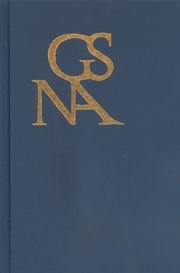Book contents
- Frontmatter
- Contents
- Illustrations
- Special section on childhood edited by Anthony Krupp
- Natural Palingenesis: Childhood, Memory, and Self-Experience in Herder and Jean Paul
- The Promises of Childhood: Autobiography in Goethe and Jean Paul
- The Education of Humankind: Perfectibility and Discipline in Kant's Lectures Über Pädagogik
- Kästchenwahl
- Sentimental Confusion: Art, Nature, and Aesthetic Autonomy in Goethe's Der Triumph der Empfindsamkeit
- Seeing the Light: Goethe's Märchen as Science—Newton's Science as Fairy Tale
- The Ironic “Tick” in Goethe's Egmont:The Potentials and Limits of the Modern Heroic and Poetic Ideal
- The Philosophical Concept of the Daemonic in Goethe's “Mächtiges Überraschen”
- “Die pilgernde Törin”: Genesis, Revaluation, and Mirroring in Goethe's Wanderjahre
- Book Reviews
Sentimental Confusion: Art, Nature, and Aesthetic Autonomy in Goethe's Der Triumph der Empfindsamkeit
from Special section on childhood edited by Anthony Krupp
Published online by Cambridge University Press: 05 February 2013
- Frontmatter
- Contents
- Illustrations
- Special section on childhood edited by Anthony Krupp
- Natural Palingenesis: Childhood, Memory, and Self-Experience in Herder and Jean Paul
- The Promises of Childhood: Autobiography in Goethe and Jean Paul
- The Education of Humankind: Perfectibility and Discipline in Kant's Lectures Über Pädagogik
- Kästchenwahl
- Sentimental Confusion: Art, Nature, and Aesthetic Autonomy in Goethe's Der Triumph der Empfindsamkeit
- Seeing the Light: Goethe's Märchen as Science—Newton's Science as Fairy Tale
- The Ironic “Tick” in Goethe's Egmont:The Potentials and Limits of the Modern Heroic and Poetic Ideal
- The Philosophical Concept of the Daemonic in Goethe's “Mächtiges Überraschen”
- “Die pilgernde Törin”: Genesis, Revaluation, and Mirroring in Goethe's Wanderjahre
- Book Reviews
Summary
If in Die Leidendes jungen Werthers of 1774 Goethe produced the ultimate sentimental text, he also provided the ultimate anti-sentimental text in Der Triumph der Empfindsamkeit. Eine dramatische Grille. Written between September and December of 1777, this play was first performed at the celebration of Duchess Luise's birthday in Weimar on January 30, 1778, and first published in the collected works of 1787. Though no longer dismissed by critics as Gelegenheitsdichtung, the play tends to be interpreted biographically, as marking a stage in the development of Goethe's psyche or artistic sensibility, rather than being appreciated for the fascinating literary critique that it expresses. And indeed, as the richness of recent critics' readings attests, the biographical matrix of this text is quite compelling, as Goethe draws (perhaps both consciously and unconsciously) on his own emotional life and social circumstances to build this complicated comic text, a text in which he clearly distances himself from the literary movement of Empfindsamkeit and from the figure of Werther. Yet this play is not only a biographical document but also a complex and sophisticated engagement with the movement of sentimentalism, particularly that movement's conception of the relationship between the artistic realm and the empirical. As Werner Vordtriede postulated over fifty years ago, the play's central theme is indeed the difference between art and nature, but (contrary to his suggestion) that fact does not render sentimentalism merely the temporal garment of that eternal theme.
- Type
- Chapter
- Information
- Goethe Yearbook 14 , pp. 83 - 102Publisher: Boydell & BrewerPrint publication year: 2007

